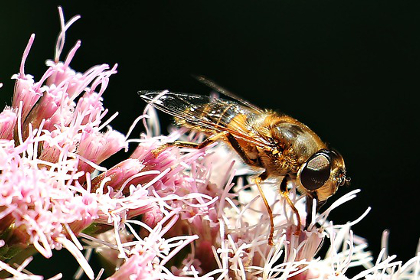
Bee’s Knees: A New $4M Effort Aims to Stop the Death Spiral of Honeybees
On the 33-acre Prairie Drifter Farm in central Minnesota, farmers Joan and Nick Olson are cultivating more than just organic vegetables. Alongside their seven acres of crops – including tomatoes, cucumbers and onions – they’ve also planted flowering plants, dogwood and elderberry hedgerows to accommodate species of bees and butterflies essential for the health of the crops.
December 11, 2016 | Source: The Guardian | by Alison Moodie
General Mills is co-funding a project with the federal government to restore the habitat of pollinators such as bees and butterflies on North American farms
On the 33-acre Prairie Drifter Farm in central Minnesota, farmers Joan and Nick Olson are cultivating more than just organic vegetables. Alongside their seven acres of crops – including tomatoes, cucumbers and onions – they’ve also planted flowering plants, dogwood and elderberry hedgerows to accommodate species of bees and butterflies essential for the health of the crops.
The Olsons are not beekeepers, but they are part of a movement to reconnect sustainable farming to a healthy environment. As part of a 2013 project by Xerces Society, a nonprofit that specializes in wildlife preservation, the Olsons worked with a biologist to figure out what types of flowers and shrubs to plant to attract bees, butterflies and other insects that pollinate plants. With seeds and plants they received from Xerxes, and those bought with federal grants, the couple also planted strips of grasses and flowers to attract beetles, which help to defend the vegetables against pests.
“There’s now a ton of bees – bumblebees, honeybees, sweat bees – and predatory insects,” Joan Olson said, adding that the flowering plants also add beauty to the land. “It’s good for the habitat but it’s also lovely for us.”
The Olsons’ effort is one that General Mills, in partnership with Xerces and the US Department of Agriculture, hopes to replicate in other parts of the country in a new initiative. The company is contributing $2m to an ongoing project by Xerces to restore 100,000 acres of farmland in North America over the next five years. The project, which will receive an additional $2m from the agriculture department, will bring General Mills’ investment in pollinator habitat restoration to $6m since 2011.
“Most of our products contain honey, fruits, vegetables and other ingredients that require pollination,” said Jerry Lynch, chief sustainability officer at General Mills. “So healthy and abundant bee populations are a priority for us.”
